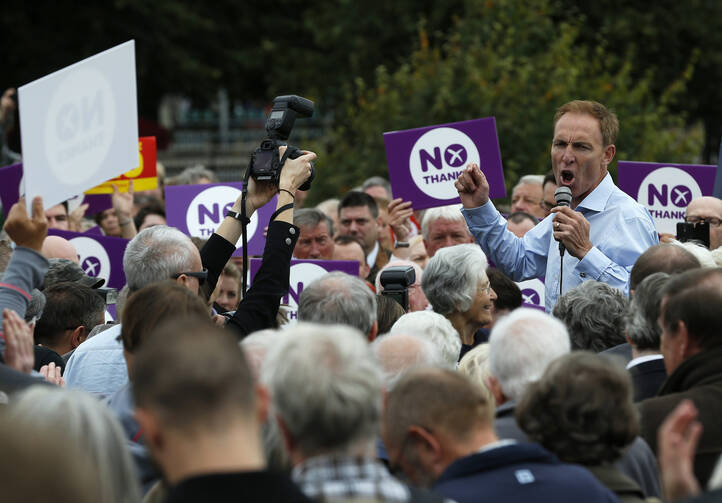Glasgow; Tuesday 02/09/14. [Owing to a technical glitch, this blog posting of 2nd September vanished for a while. For the sake of continuity, I now offer it again.]
On the ground here on Scotland, the independence referendum outcome is now on a knife-edge. With a little over two weeks to go, polls in even the most pro-Union media (that’s the majority) are calling for a close finish. It’s on a volatile tight-rope. “No” are still ahead, in the conventional polls, but only just. “Yes” has seen another significant swing over the last 10 days or so; still with the political and popular momentum, that’s still not showing up in those polls and thus leading many to wonder if conventional polling is capturing the reality.
A second TV debate between the principals from each side, Edinburgh First Minister Alex Salmond and Labour’s pro-union Alistair Darling, saw Salmond wipe the floor with his opponent. Yet it might not have mattered that much; the voting-intentions figures shifted only slightly. Over in Boston, the great Thomas P. "Tip" O’Neill used to state that “all politics is local.” In Scotland, the home turf for the pro-independence “Yes” campaign is online and informal, local and interpersonal while Unionist “No” campaigners are sticking to the mainstream, old media and more traditional methods. This opens up the tantalizing possibility that pre-referendum polling is not asking the right people or even the right questions and thus could be miles adrift of the reality. It may well be that the mainstream political class is simply not hearing the lively debate that is sweeping this country.
One striking absence from the debate has been that of the churches. On the weekend the country’s two Roman Catholic Archbishops issued a call to all Catholics to be sure to register by the Sept.2nd deadline and, in the words of Archbishop Cushley of St.Andrew’s and Edinburgh, “in the light of Catholic social teaching, carefully to consider the issues and to do your civic duty on the day itself.” This was the first and, so far, only official intervention from the RC Church. Archbishop Philip Tartaglia (Glasgow), president of the Bishops’ Conference of Scotland, wrote to his flock: “Along with the bishops of Scotland, who are deeply conscious of the importance of this referendum, I encourage and urge all those eligible to vote to do so with complete freedom of choice and in accordance with their prayerful judgment of what is best for the future.” There was a time, in living memory, when in the population center of the industrialized central belt, it would have been commonplace to hear voting instructions delivered from the pulpit on a Sunday; no more. Individual ministers in the Presbyterian Church of Scotland and the (Anglican) Scottish Episcopal Church have sporadically declared their stances. Overall the churches and faith-groups have otherwise not been visible.
Regardless of either result on Sept.18, what we’re seeing here is new beyond compare. There is an extraordinary surge of political engagement and debate in the street, in the workplaces, in the cafes and pubs in the cities and the places where the rural and island communities gather. In every town, “Yes” is prominent, promoting meetings, discussions and events; “No” seems to have abandoned that territory, for you see little sign of their campaign anywhere. Button-badges for "Yes" (you just don’t see any "No" equivalents) everywhere set off animated conversations that relegate even football to minor importance. The mainstream media are overwhelmingly pro-Union; this is true also across the whole of the UK, where even the Guardian, noted for decades for its radical stance, is consistently negative about the independence case. In Scotland there are over 30 major newspaper titles, only one of which, the Herald on Sunday, has come out for independence. The pro-Union stance of the main TV broadcasters, BBC and STV, is plain to see.
What’s left is a growing sense that the two sides are playing the same game but in different stadia; the old and the new are not meeting in the middle. And the two sides are far from mirror-images of each other. Independence campaigners form a broad yet informal alliance of over 300 groups. First Minister Salmond’s SNP takes the lead, because they are in power at Holyrood and received an electoral mandate to hold the referendum, but the "Yes" campaign is much broader than the SNP. Pro-union forces are largely an uneasy alliance between the Labour, Liberal and Conservative parties; they look noticeably uncomfortable when they have to share a platform. The "Yes" campaign does strike one here as positive, full of ideas and possibilities and the capacity to accept the political uncertainties and economic risks that the No campaign relentlessly targets. Pro-union campaigners persistently emphasize the uncertainty around post-independence currency arrangements although they have dropped their erroneous claims that Scotland has been subsidized by London, now that it’s become plain that it’s been the other way round. They have clearly taken a strategic decision to target Salmond personally and to refer constantly to the SNP rather than to the "Yes" campaign; in other words, old politics. “Yes”, insisting on the bright economic possibilities that a go-it-alone Scotland could enjoy, insist that the best future lies in self-governance, breaking free from London’s dominance. Scare stories, of which there have been plenty from the pro-union side, are looking less effective in these final days of this fascinating campaign. The new politics will not go away after Sept. 18 but, regardless of the result, nobody knows what it will look like on the 19th and beyond.








